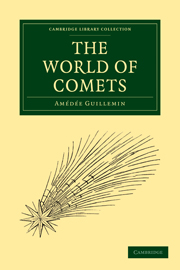Book contents
- Frontmatter
- EDITOR'S PREFACE
- PREFACE
- Contents
- LIST OF ILLUSTRATIONS
- CHAPTER I BELIEFS AND SUPERSTITIONS RELATIVE TO COMETS
- CHAPTER II COMETARY ASTRONOMY UP TO THE TIME OF NEWTON
- CHAPTER III THE MOTIONS AND ORBITS OF COMETS
- CHAPTER IV PERIODICAL COMETS
- CHAPTER V PERIODICAL COMETS
- CHAPTER VI THE WORLD OF COMETS AND COMETARY SYSTEMS
- CHAPTER VII PHYSICAL AND CHEMICAL CONSTITUTION OF COMETS
- CHAPTER VIII PHYSICAL TRANSFORMATIONS OF COMETS
- CHAPTER IX MASS AND DENSITY OF COMETS
- SECTION I FIRST DETERMINATION OF THE MASSES OF COMETS
- SECTION II METHOD OF ESTIMATING THE MASSES OF COMETS BY OPTICAL CONSIDERATIONS
- SECTION I THIRD METHOD OF DETERMINING THE MASSES OF COMETS
- CHAPTER X THE LIGHT OF COMETS
- CHAPTER XI THEORY OF COMETARY PHENOMENA
- CHAPTER XII COMETS AND SHOOTING STARS
- CHAPTER XIII COMETS AND THE EARTH
- CHAPTER XIV PHYSICAL INFLUENCES OF COMETS
- CHAPTER XV SOME QUESTIONS ABOUT COMETS
- I ELLIPTIC ELEMENTS OF THE RECOGNISED PERIODICAL COMETS OF THE SOLAR SYSTEM
- II GENERAL CATALOGUE OF THE ORBITS OF COMETS
- Plate section
SECTION I - FIRST DETERMINATION OF THE MASSES OF COMETS
Published online by Cambridge University Press: 05 March 2012
- Frontmatter
- EDITOR'S PREFACE
- PREFACE
- Contents
- LIST OF ILLUSTRATIONS
- CHAPTER I BELIEFS AND SUPERSTITIONS RELATIVE TO COMETS
- CHAPTER II COMETARY ASTRONOMY UP TO THE TIME OF NEWTON
- CHAPTER III THE MOTIONS AND ORBITS OF COMETS
- CHAPTER IV PERIODICAL COMETS
- CHAPTER V PERIODICAL COMETS
- CHAPTER VI THE WORLD OF COMETS AND COMETARY SYSTEMS
- CHAPTER VII PHYSICAL AND CHEMICAL CONSTITUTION OF COMETS
- CHAPTER VIII PHYSICAL TRANSFORMATIONS OF COMETS
- CHAPTER IX MASS AND DENSITY OF COMETS
- SECTION I FIRST DETERMINATION OF THE MASSES OF COMETS
- SECTION II METHOD OF ESTIMATING THE MASSES OF COMETS BY OPTICAL CONSIDERATIONS
- SECTION I THIRD METHOD OF DETERMINING THE MASSES OF COMETS
- CHAPTER X THE LIGHT OF COMETS
- CHAPTER XI THEORY OF COMETARY PHENOMENA
- CHAPTER XII COMETS AND SHOOTING STARS
- CHAPTER XIII COMETS AND THE EARTH
- CHAPTER XIV PHYSICAL INFLUENCES OF COMETS
- CHAPTER XV SOME QUESTIONS ABOUT COMETS
- I ELLIPTIC ELEMENTS OF THE RECOGNISED PERIODICAL COMETS OF THE SOLAR SYSTEM
- II GENERAL CATALOGUE OF THE ORBITS OF COMETS
- Plate section
Summary
Lexell's comet, and the calculations of Laplace–The smallness of cometary masses deduced from the fact that comets exercise no disturbing influence upon the earth, the planets, or their satellites.
The educated have long since ceased to believe in the mysterious influence of comets upon human events ; such a belief, in fact, would imply a degree of superstition very little in accordance with the spirit of modern times, and would denote complete ignorance of astronomical phenomena. But if comets, by their unexpected apparitions, no longer announce to the world some great event or terrible catastrophe, are they not capable of acting yet more directly for the overthrow of our planet, either by disturbing it in its movement or by striking against it in a rencontre which might prove fatal to its inhabitants? We will further on consider the probability of such a rencontre, and the effect it would produce upon our globe and its inhabitants. But it is easy to understand that these effects would very greatly depend upon two elements of which we have not yet spoken, viz. the mass and density of the comet.
I have elsewhere endeavoured to give an elementary idea of the methods which astronomers have recourse to in order to calculate the mass of any celestial body; that is to say, the quantity of matter it contains as compared with the mass of the earth or of the sun; in short, to weigh it.
- Type
- Chapter
- Information
- The World of Comets , pp. 277 - 280Publisher: Cambridge University PressPrint publication year: 2010First published in: 1877



